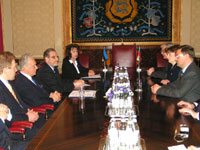| |
 | Press Releases | | |
The President of the Republic met with Russian Duma's Foreign Affairs Committee Chairman22.02.2005
 President Rüütel today at Kadriorg met with Chairman of the Foreign Affairs Committee of Russian Duma Konstantin Kossatchev and the delegation accompanying him. President Rüütel today at Kadriorg met with Chairman of the Foreign Affairs Committee of Russian Duma Konstantin Kossatchev and the delegation accompanying him.
At the meeting, the recent history of Estonia and Russia, and the documents that form the bases of bilateral relations between the two countries were discussed. The January 1991 Treaty between the Republic of Estonia and the Republic of the Russian Soviet Federative Socialist Republic on the Foundation of Interstate Relations, which confirmed the legal continuity of Estonian state, was discussed at greater length.
According to the Head of Estonian state that treaty provided a bases of developing cooperation also in those areas that nowadays are covered by the Joint EU-Russia Action Plan on the Common Spaces. Therefore, according to President Rüütel, there is no necessity today to work out an entirely new declaration of the relations between Estonia and Russia.
The President of the Republic spoke about the events from the history of Estonia, which took place as direct consequence of the Molotov-Ribbentrop Pact during World War II, enormous human losses, and about Estonia's efforts to restore its independence in 1944. President Rüütel said that the viewpoint fixed in the 1989 Resolution by the USSR Congress of People's Deputies ''On the political and legal evaluation of the 1939 Soviet-German non-aggression treaty'', was still important.
At the meeting, Chairman of the Foreign Affairs Committee of Russian Duma said that there was no reason to justify or diminish the crimes committed under Stalin's regime. According to Konstantin Kossachov, Russia had condemned the Molotov-Ribbentrop Pact already on several occasions. By his judgement Estonian and Russian viewpoints diverged because of different understanding of whether that pact could be denounced, and whether the post-war period could be considered as occupation of Estonia by the Soviet Union in a legal sense. According to Kossachov the Estonian and Russian political assessments of the recent history were not so very different, and Russia was ready to take the advantage of the situation that had opened up in the relations between the two countries and break the vicious circle of mutual accusations.
Both sides expressed mutual readiness to intensify the political dialogue between Estonia and Russia. President Rüütel said that additional opportunities would open up with the participation of Estonia in the development of partnership relations between the European Union and Russia and between NATO and Russia.
Present at that meeting from Estonian side were Marko Mihkelson, the Chairman of the Foreign Affairs Committee of the Riigikogu and Enn Eesmaa, a member of the Foreign Affairs Committee. Among the Russian delegation were also Natalya Narotchnitskaya, the Deputy Chairman of the Foreign Affairs Committee of Russian Duma, members of the Foreign Affairs Committee Nikolai Benediktov and Andrei Zhukov, and Ambassador of the Russian Federation in Estonia Konstantin Provalov.
Public Relations Unit of the Office of the President
Kadriorg, February 22, 2005
|
| |
|